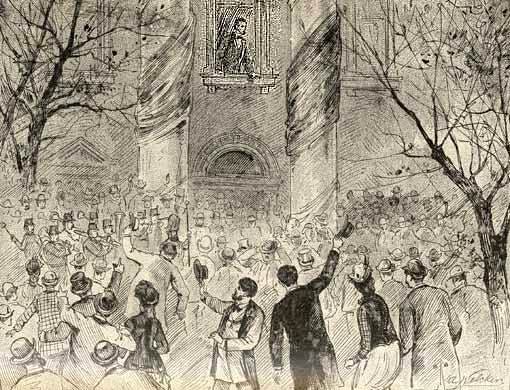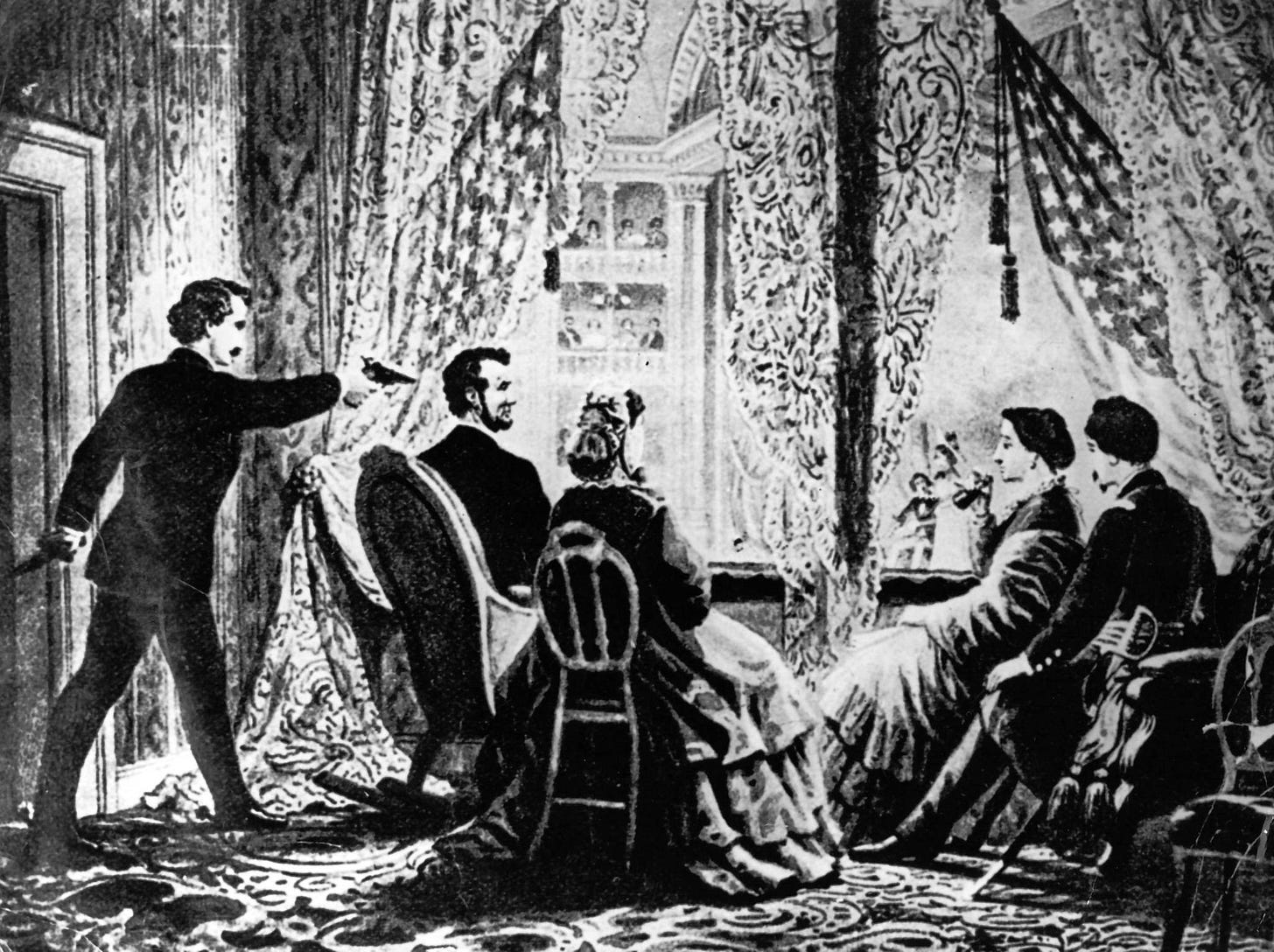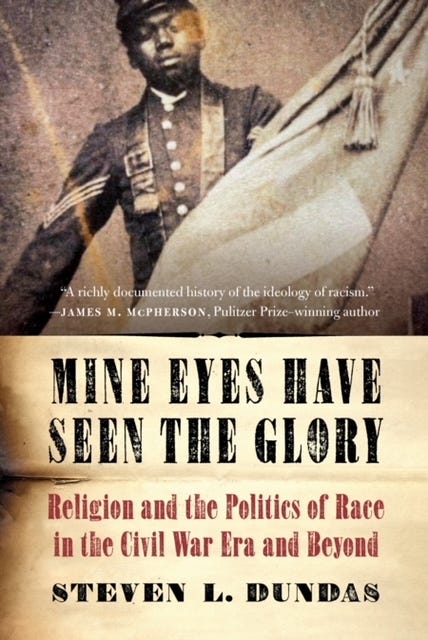A Heart that Beat for Freedom Everywhere
Reflecting on the Assassination of Abraham Lincoln amid New Threats to Freedom
On the morning of April 14th, 1865, Major General Robert Anderson marched with the stained and tattered 33 Star American Flag he had removed from Fort Sumter when it was surrendered to the Confederate General, P.T.G. Beauregard to the flagpole standing in the ruins of the battle-scarred fortress. It was highly symbolic, occurring exactly four years to the day that Beauregard’s forces raised the Stars and Bars above Sumter, which triggered the bloodiest war in American History. Anderson and the man who served as his Color Sergeant in 1861 removed the flag from a leather dispatch bag. They gave it to three Sailors who attached it to the halyard, and Anderson spoke a few words, “After four long, long years of war, I restore to its proper place this flag which floated here during peace, before the first act of this cruel Rebellion….”
As the flag was raised, loud cheers erupted from the crowd which was drowned out by the salute rendered by six of Sumter’s cannons and the replies of cannons at batteries around the harbor. That evening, the fiery abolitionist, William Lloyd Garrison who attended the flag raising toasted President Abraham Lincoln, a man who he frequently criticized, saying Lincoln’s “brave heart beats for human freedom everywhere.” Neither Garrison or anyone in Charleston know that Lincoln’s heart would not beat much longer.
As the day’s events in Charleston reached their conclusion, Lincoln and his wife, Mary Todd Lincoln, arrived at Ford’s Theater to watch the play “Our American Cousin” a farcical look at the visit of an American visiting his English relatives when going to settle the family estate.
Lincoln was looking forward to the play. Though the war continued the surrender of Robert E. Lee’s Army of Northern Virginia to Ulysses S. Grant on April 9th for all intents and purposes had placed the final nail in the Confederacy’s malevolent coffin, and it was if a burden have been removed from Lincoln’s shoulders. His task now what the reintegration of the rebellious states back into the Union, a task that he believed needed to be accomplished without malice while still seeking justice. He made this clear in his Second Inaugural Address just over a month before:
“With malice toward none, with charity for all, with firmness in the right as God gives us to see the right, let us strive on to finish the work we are in, to bind up the nation’s wounds, to care for him who shall have borne the battle and for his widow and his orphan, to do all which may achieve and cherish a just and lasting peace among ourselves and with all nations.”
Just three days before Lincoln had given his last public speech at the White House. It was a practical speech dealing with the nuts and bolts of reuniting the country, including announcing his support for Negro Suffrage. He said:
“By these recent successes the re-inauguration of the national authority — reconstruction — which has had a large share of thought from the first, is pressed much more closely upon our attention. It is fraught with great difficulty. Unlike a case of a war between independent nations, there is no authorized organ for us to treat with. No one man has authority to give up the rebellion for any other man. We simply must begin with, and mould from, disorganized and discordant elements. Nor is it a small additional embarrassment that we, the loyal people, differ among ourselves as to the mode, manner, and means of reconstruction.”
In the speech, Lincoln discussed the issues related to the new government of Louisiana and its dealings with African Americans, which did not go far enough for Lincoln, who was intent on extending the franchise to vote for all blacks, even if it took time to make it so. John Wilkes Booth was in attendance that day, and as he listened, he became ever angrier, and the actor vowed to a fellow conspirator Lewis Powell, “That is the last speech he will make,” and Booth was going to ensure this himself.
Lincoln had been troubled for some time by terrible insomnia and dreams, both bizarre and ghoulish. A few days before, he had told Mary and others sharing dinner with them of a troubling dream which he described in detail, Mary and those at the table so accustomed to Lincoln’s customary wit and humor were stunned as Lincoln spoke. He closed the description with these words:
“Determined to find the cause of a state of things so mysterious and shocking, I kept on until I entered the East Room, which I entered. There I was met with a sickening surprise. Before me was a catafalque, on which rested a corpse wrapped in funeral vestments. Around it were stationed soldiers who were acting as guards; and a throng of people, some gazing mournfully at the corpse, whose face was covered, others weeping pitifully: ‘Who is dead in the White House?’ I demanded of one of the soldiers. ‘The President’ was the answer; ‘he was killed by an assassin!’ “Then came a loud burst of grief from the crowd….”
Mary and the others were so upset, particularly with the large number of death threats Lincoln had received throughout the war. However, Lincoln told them all not to worry as “it was only a dream.” wanting General Grant and his wife to attend. However, was
On that Good Friday Lincoln was determined not to mourn, instead of attending Good Friday services or contemplating the war, or reconstruction, he simply wanted to laugh and chose to attend the play. Lincoln invited General Ulysses Grant to attend; however, Grant needed to travel to New Jersey and declined the offer.
Despite this Lincoln was in a cheerful mood, looking forward to the future and discussing all the things that he wanted to see and do after his term in office. Mary was startled by his cheerfulness and Lincoln told her “I have never felt better in my life.” Lincoln and his party arrived late to the cheers of the cast and took their seats in the box about 8:30 to the strains of Hail to the Chief. As the play resumed Lincoln’s bodyguard slipped away to get a drink and about twelve minutes after 10:00, the famous and handsome actor, John Wilkes Booth slipped into the box where Lincoln sat watching the play and drew a Derringer pistol from his pocket. Then, as the crowd roared its delight at a particularly funny scene a shot rang out and Lincoln’s arm jerked up and he slumped over. Booth then jumped to the stage from the box, injuring his leg, shouting “Sic semper tyrannis” or thus always to tyrants. It began a series of attempted assassinations designed to decapitate the Federal government. Secretary of State Seward was badly wounded by Lewis Payne, a third assassin who backed out at the last minute and failed to attack Vice President Johnson.
Though physicians sought to save the President the wound was mortal, the bullet having ender the back of his head, and dug deep into his brain, lodging behind his left eye. At 7:22 A.M. Abraham Lincoln was dead. It was a disaster for the nation as the new President, Andrew Johnson was a political enemy of Lincoln and not in line with Lincoln’s understanding of reconstruction and reconciliation. A poor Southerner from Tennessee, Johnson hated the Southern plantation aristocracy. He would act as a punisher, while radical reconstructionist members of the cabinet and Congress would act in such a way that reconstruction would never achieve all that Lincoln believed that it could.
While radical Confederates rejoiced in Lincoln’s death others were more circumspect. Jefferson Davis who was fleeing and hoping to continue the war realized that the South would not fare as well under Johnson as Lincoln. In fact Johnson’s lack of understanding of the nuances of northern politics as well as his loathing of blacks, his “beliefs, prejudices, personality traits were a recipe for disaster at a time when an unprecedented national crisis put a premium on the capacity to think in new and creative ways.”
The officers and soldiers of the Army of the Potomac learned of Lincoln’s assassination on Easter Sunday. Joshua Chamberlain told a woman whose mansion was at the center of his division’s camp when she asked what disturbed him “It is bad news for the South.” When the woman asked if it was Lee or Davis, Chamberlain told her it was Lincoln and said, “The South has lost its best friend, Madam.”
Chamberlain ordered the chaplain to conduct a field memorial for the fallen President. The division chaplain, a Catholic Priest, Father Egan, spoke and roused the men, and Egan ended his service “Better so, better to die glorious than live infamous. Better to be buried beneath a nation’s tears than to walk the earth guilty of the nation’s blood.”
During the war, Lincoln had endeared himself to his soldiers and they responded with great emotion. One burst into tears and sobbed “He was our best friend. God bless him,” another wrote home “What a hold Old Abe had on the hearts of the soldiers of the army could only be told by the way they showed their mourning for him.” Admiral David Dixon Porter wrote, “The United States has lost the greatest man she ever produced.”
The bullet fired by John Wilkes Booth was a disaster for the country. Sadly, there are some today, such as the White Supremacist group, “The League of the South” who choose to celebrate the assassination of the man that they so hate, and honor the assassin Booth as a hero. They are not alone, many people that do not consider themselves white supremacists support politicians of a party now dedicated to tearing down the advances begun by Lincoln, and continued in the Thirteenth, Fourteenth, Fifteenth, and Nineteenth Amendments, and who believe that all people are not created equal. Civil Rights, Voting Rights, Free Speech Rights, and personal liberties are being rolled back throughout the United States, while the extremists who attempted a coup on January 6th, 2021 arm and plan for more.
I agree with Admiral Porter that there has never been a President before or after who was anything like this man. So today, I dedicate myself to the quest for equality of all people and for a reconciliation. I will continue to work for that “new birth of freedom” that Lincoln so firmly believed in.
It is important that we fight to continue the work that Lincoln began. Please feel free to join me here as I build this site to include a podcast and share special events, speaking engagements, and book signings, and begin to share ideas with other Stubstack writers.
My book, “Mine Eyes Have Seen the Glory: Religion and the Politics of Race in the Civil War Era and Beyond,” is available at Amazon and other retailers.
Pulitzer Prize-winning historian James McPherson said that it is “A richly documented history of the ideology of racism that manifested itself in slavery, the Confederacy, the overthrow of Reconstruction, Jim Crow, and the myth of the Lost Cause that glorified the Old South and the Confederacy.”
Margaret Sankey, author of “Blood Money: How Criminals, Militias, Rebels, and Warlords Finance Violence,” wrote: “Steve Dundas’s electrifying new take on the American Civil War and its continuing presence in politics, race relations, and corrosive mythology is visceral and pulls no punches. It shows military and other readers that racism is a national security issue.”










Your essay has me choked up. The way you tell the story is in such detail, and so moving, that I feel as if I am there. What a completely heartbreaking thing -- for the entire nation, as Chamberlain said -- that President Lincoln was murdered. I learned about his successor, about whom I knew very little. And your telling of the story of Lincoln's dream (I'd heard before that he'd dreamed his death, but never any of the details) was terrifying to read. I have lived in Charleston for over 40 years. Never once have I heard about the removal of the Confederate flag, and it's replacement by the U.S. flag -- let alone the fact that it occurred the day of Lincoln's assassination. The irony is astounding. Thank you for including me in your new substack. I am so impressed. I hope that more people will read what you write.